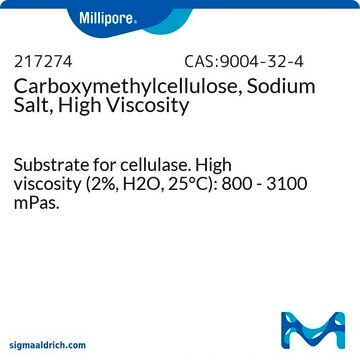21904
Carboxymethylcellulose sodium salt
ultra high viscosity, highly purified
Synonym(s):
Sodium carboxymethylcellulose
About This Item
Recommended Products
Quality Level
form
powder
quality
highly purified
availability
not available in USA
color
beige
useful pH range
6.5 - 8.5
viscosity
1500-4500 mPa.s, 1 % in H2O(25 °C)
solubility
water: soluble
InChI
1S/C6H12O6.C2H4O2.Na/c7-1-3(9)5(11)6(12)4(10)2-8;1-2(3)4;/h1,3-6,8-12H,2H2;1H3,(H,3,4);
InChI key
DPXJVFZANSGRMM-UHFFFAOYSA-N
Looking for similar products? Visit Product Comparison Guide
Application
Other Notes
Storage Class Code
11 - Combustible Solids
WGK
WGK 1
Flash Point(F)
Not applicable
Flash Point(C)
Not applicable
Personal Protective Equipment
Certificates of Analysis (COA)
Search for Certificates of Analysis (COA) by entering the products Lot/Batch Number. Lot and Batch Numbers can be found on a product’s label following the words ‘Lot’ or ‘Batch’.
Already Own This Product?
Find documentation for the products that you have recently purchased in the Document Library.
Customers Also Viewed
Our team of scientists has experience in all areas of research including Life Science, Material Science, Chemical Synthesis, Chromatography, Analytical and many others.
Contact Technical Service



